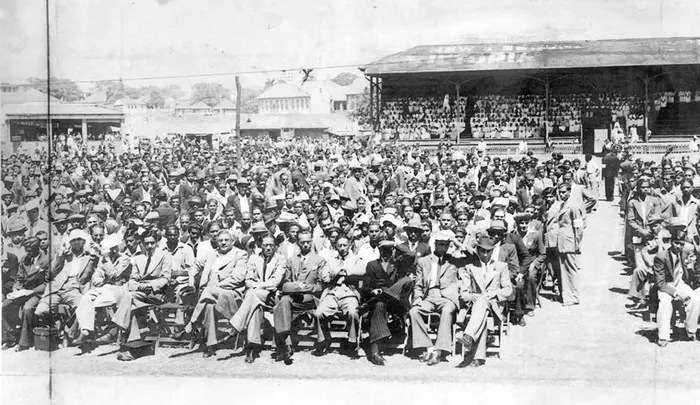Natal Indian Congress marks 130th anniversary

NIC Mass meeting, 1945, Curries Fountain
The Natal Indian Congress (NIC) will be commemorating its 130th anniversary this year, with a number of prominent members coming together to kick off its celebrations.
Yunus Carrim, former NIC executive committee member, SA Communist Party (SACP) Politburo member and African National Congress (ANC) MP, who is part of the organising committee for the commemorative events said it was important to remember the contributions that the NIC made to democracy in South Africa.
“The Natal Indian Congress was the first of the Congress organisations to be formed in 1894 by Mahatma Gandhi. It campaigned against the removal of the vote for propertied Indians in Natal with a petition of 10 000 signatures in 1894; the Asiatic Land Tenure and Indian Representation Act from 1946 to 1948, with over 2 000 people being detained; and together with the ANC, in the 1952 Defiance Campaign against unjust laws. It was the founding organisation upon which the African National Congress was formed and policies adopted from,” said Mr Carrim.
“It also took part in the 1955 Congress of the People and supported the Freedom Charter. After the ANC’s banning in 1960, its members took part in the armed struggle and the political underground,” said Mr Carrim.
He said the NIC campaigned against the Apartheid-related South African Indian Council in the 1970s and the House of Delegates from 1984.
“The NIC petered out after discussions with the ANC before the 1994 elections and its members joined the ANC. The NIC had a significant support base until the 1960 state of emergency and the arrest, banning and other repression of its leaders,” said Mr Carrim.
“After its 1971 revival, it didn't have a huge mass following, but its activities had an impact on the Indian community,” he said.
Mr Carrim said it was important to remember the NIC and its help in the fight against apartheid “ because it played a very significant role in the struggle for our non-racial democracy and the younger generation know very little about this”.
“We must also remind people that from Gandhi's time Indian people took part in the struggle. This democracy belongs to them as much as anybody else,” said Mr Carrim.
“They can't escape their history. And whatever the problems in our country, they also have to help to make this democracy work,” he said.
Mr Carrim said a group of activists had come together to ensure the celebrations take place.
“We have contacted as many of the members of the executive elected at its last conference in 1987 and as many of the other senior activists as possible.”
He said the actual anniversary will take place in August.
Ravi Pillay, who is also on the organising committee, said members of the NIC who were struggle icons included prominent leaders from the 1940s to 1994 such as Monty Naicker, George Sewpersad, Farouk Meer, MJ Naidoo, JN Singh, Mewa Ramgobin and Fatima Meer.
Related Topics: